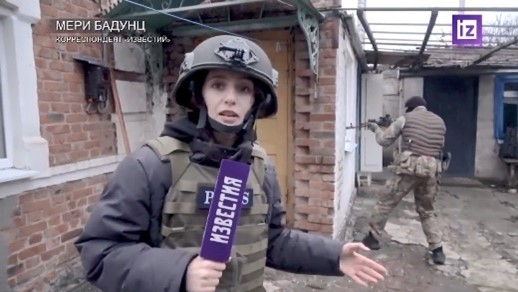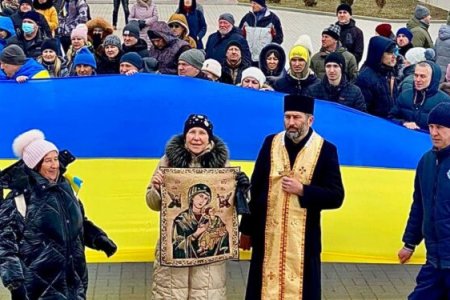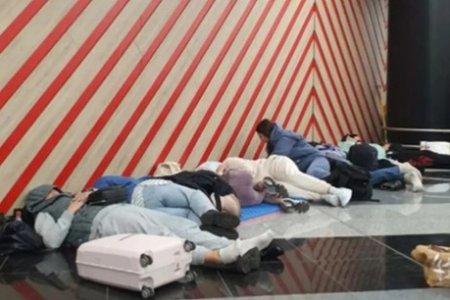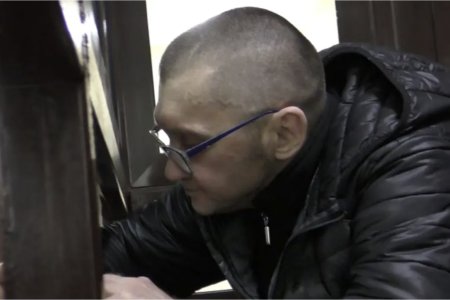
Russia’s FSB [security service] claim to have ‘thwarted’ a new attack on a collaborator in occupied Berdiansk and captured those responsible for the deaths of several Russian-installed officials. The fact that the FSB only reported, and had a television crew film this alleged ‘operation’ and ‘arrests’ in February, although two of the men had been in Russian captivity since November 2022 is only one of numerous reasons for doubting this latest of many FSB-fabricated ‘Ukrainian saboteur plots’.
Reports in the Russian media suggest that at least four, but perhaps five, Ukrainians from Berdiansk have been ‘detained’. The FSB claim that all have ‘confessed’ which makes it particularly suspicious that only two men are shown on video, giving very strange ‘testimony’.
On 9 February, the Russian state-controlled RIA Novosti claimed that the FSB had detained members of a gang involved in the killings of what they called “the leadership of the city”. This had, supposedly, thwarted at least one other attack already planned.
The main information, even in one of the two alleged ‘confessions’, largely boils down to a list of the attacks on collaborators. Artem Bardin, Russian-installed ‘commandant’, was killed in June 2022 by a car bomb. Oleksandr Kolesnikov, the Russian-appointed ‘deputy head of the traffic police’, was killed by a bomb in August 2022. On 16 September, Oleh Boiko, so-called ‘deputy mayor’ of Berdiansk was shot dead, together with his wife, Liudmyla Boiko. The latter had been the so-called ‘head of the election commission’ for the fake ‘referendum which Russia staged as attempted justification for its invasion and annexation. There had also been an explosion at the ‘United Russia’ party’s supposed ‘humanitarian aid headquarters in Berdiansk. It is also suggested that an attack was being planned on the so-called ‘first deputy mayor’ of Berdiansk, Pavlo Ishchuk.
The FSB appear to use certain templates when fabricating charges against Ukrainians and this case bears ominous similarities to those seen in occupied Crimea back in 2016. At least four of the Ukrainians whom the FSB and Russian propaganda media showed ‘confessing’ in August and November 2016 were later convicted on charges scarcely related, or entirely different from, what they ‘admitted to’ on video.
For the moment, the FSB’s story appears to be that the above-listed attacks were carried out on the instructions of Andriy Pitiukin , a former Berdiansk police officer now working for the Ukrainian Defence Ministry’s Military Intelligence [HUR], and Tetiana Omelianenko, the mother of one of the men detained who is living in Poland.
RIA Novosti asserts that one of the detained ‘saboteurs’ spoke of a secret hiding place holding all the necessary items for the attack, with this allegedly found by the FSB.
Two men are seen giving ‘confessions’ on video and are clearly in Russian captivity. The first of these is 22-year-old Damian Omelianenko, however RIA Melitopol reported back in December 2022 that he had been abducted by the Russians for the second time on 16 November that year. He had been seized the first time at the end of May and held prisoner and tortured for a month before being released at the end of June. The young man had earlier studied at the Kharkiv Airforce University which, alone, could have made the Russians target him. Aside from reeling off a list of the attacks on the video, and making crucial mistakes as to the timing of two of them, Omelianenko states that his role was to provide information about these individuals, and to pass them to his mother, Tetiana Omelianenko. She is then shown on the video, speaking from Poland and saying that she had been contacted by the Ukrainian military. The Centre for Journalist Investigations managed to speak with Tetiana who has lived and worked in Poland for many years. She explains that her son was seized by the Russians for the second time on 16 November 2022, and says that they contacted her the following day. They demanded that she ‘confess’ on video to planning acts of terrorism, and threatened that otherwise they would kill Damian.
The video is part of the FSB genre, where men (or women) who are totally under Russian control and held incommunicado, provide ‘confessions’ that appear to have been learned off by heart. There is nothing to suggest that Omelianenko has been given a lawyer, although the unseen interrogator gets him to recite the kind of ‘sentence’ he faces and to tell others not to act as he, allegedly, has.
A second video is seen with a man significantly older than Omelianenko, who identifies himself as Oleksiy Makarenko (b. 1980). Although he says at the beginning that he was detained for organizing a bomb blast, his ‘confession’ is somewhat bizarre and confused. He is a former military serviceman (which would have meant that he too was on the invaders’ list of targets) and says that somebody he served with got in touch and asked him to make a phone call to ensure the explosion to remove Kolesnikov. Here, as in many other such videos, it is claimed that he was offered money for his services, with the FSB eager to avoid suggesting that people could be carrying out such acts in defence of their country. It is not entirely clear what the alleged ‘services’ were since he essentially says only that he made two phone calls for the removal, for example, of Kolesnikov, with no explanation as to how this could have detonated bombs. Another typical aspect of such ‘plots’ is that he was supposed to get more money for the second phone call, but never received it, and that he hadn’t wanted to take part in the second ‘crime’ but was essentially threatened into doing so. Since his role was allegedly only to make these calls, it is also not easy to understand why the ‘search’ of his home is claimed to have found explosives.
The Centre for Journalist Investigations reports a third such video where a person whose face is totally concealed, but who calls himself Danylo Kakablin, says that he did not take part in any partisan activities.
Another Russian publication names another person detained as 25-year-old Artur Shashenok, describing him as Omelianenko’s childhood friend. That report does, admittedly acknowledge that both young men were seized in November, without trying to explain why the FSB reported their seizure now.
Despite Russia’s fake ‘referendums’ and claims that virtually everybody ‘voted to join Russia’, resistance to the invaders remains strong and a number of collaborators have been killed or seriously injured by Ukrainian partisans. The FSB will be under pressure to find Ukrainians whom it can torture into providing ‘confessions’, however garbled and unconvincing.
The Berdiansk Partisan Army reacted immediately to the Russian media claims about the supposed ‘Berdiansk saboteurs’. They stated that none of the detained men had any connection with their partisan movement, and said that the FSB were merely trying to prove they were doing something and calm the nerves of other collaborators worried that they may be the next target.



